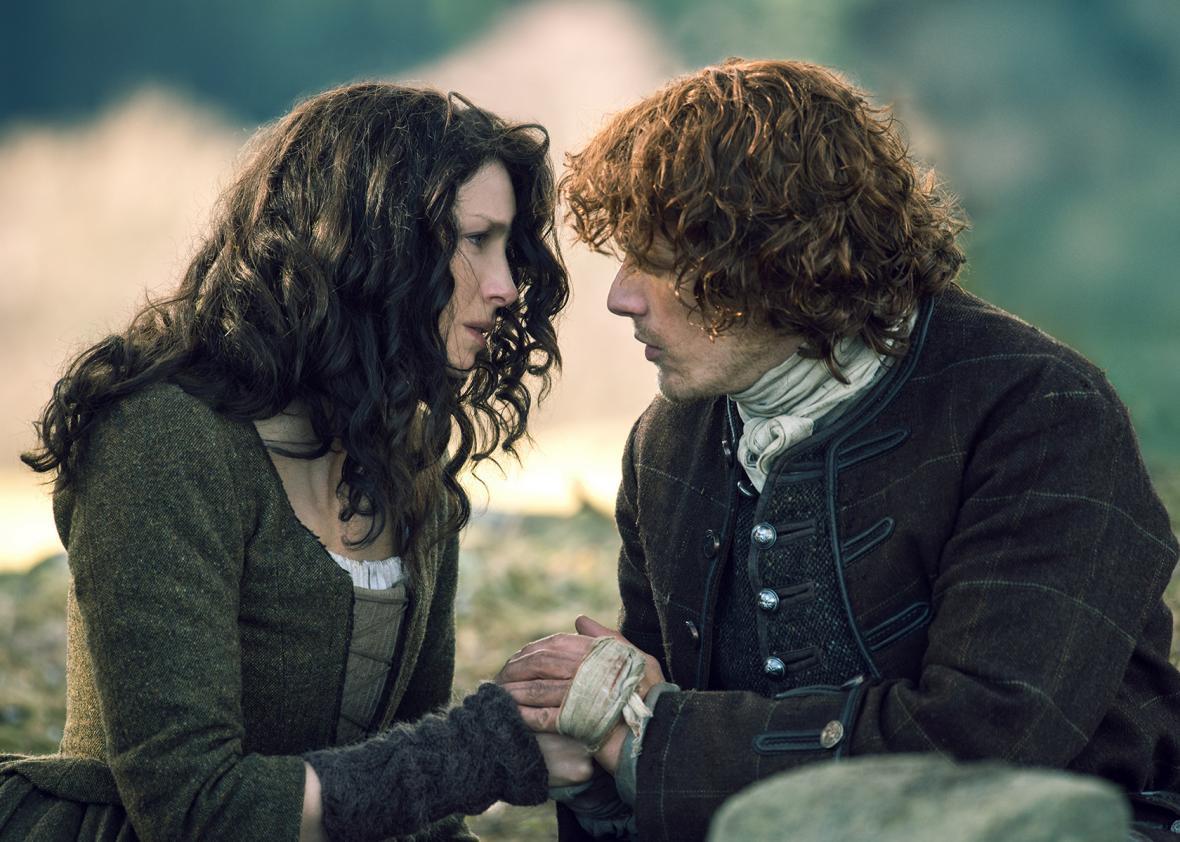With all its heaving bodices, psychopathic villains, and time travel–related minutiae, Outlander would be easy to dismiss as a period romance and little more. And while in the past the show has dedicated plenty of time to petty vengeances and personal melodramas, Saturday night’s 90-minute finale served as a reminder that behind all the romance and intrigue, Outlander is, at its core, a political show—one you might even call the Scottish Game of Thrones.
Outlander’s second season has marched relentlessly toward its inevitable historical conclusion even as Claire and Jamie have made every effort to change the timeline: specifically, to avoid the April 16, 1746, Battle of Culloden, in which the Scottish rebels were slaughtered by the British military, ending their fight to restore a Stuart monarchy and assert their independence. But though the Frasers’ efforts to alter history proved unsuccessful, the show’s finale stopped short of showing the actual battle that would mark the beginning of the end of the Highland way of life. Instead, it leapt more than two centuries ahead, to 1968, where Claire had rejoined modern-day Scotland. There we got a disconcerting reminder that Scottish nationalism had not been left in the 18th century, as we stumbled upon a radical political activist (Season 1’s Geillis Duncan, no less) delivering a pro-independence speech:
We can no longer allow their vision to dictate ours. When Scotland was united with England under a single crown, it was the beginning of the end for us. We lost more than our independence. We lost our spirit. The government in Westminster, the bankers in the city, the newspapers of Fleet Street have stolen our money, our voices, our futures.
The timing of this episode gave that rhetoric an eerie familiarity. Though the U.K. as a whole voted to leave the EU in June, 62 percent of Scotland voted to remain, a disparity that reignited the debate over Scottish independence when Scottish First Minister Nicola Sturgeon announced she would revisit the possibility of breaking away from the U.K. in favor of standing with Europe. SNP Westminster leader Angus Robertson seconded that opinion this past Sunday, promising a second independence referendum if negotiations for Scotland to stay in the EU alone failed.
Outlander played a small but fascinating role in the first Scottish independence referendum in 2014, before Season 1 had even hit the airwaves. The show made its debut in the U.S. in August of that year, followed shortly by premieres in Australia, Canada, and Ireland, but its U.K. release was delayed by almost nine months until March 2015. This led to speculation that Outlander’s premiere had been deliberately postponed until after September independence referendum, out of fear that its patriotic themes could influence the vote in favor of leaving the U.K.
It was a theory that seemed absurd—after all, this was a show better known for its steamy sex scenes than its inflammatory political ideology. But emails leaked in the Sony hack suggest that’s exactly what happened—one communication from Sony’s vice president Keith Weaver claims that David Cameron himself was set to meet with Sony executives to discuss Outlander’s political impact, specifically as it related to the upcoming Scottish independence vote:
From a SPE perspective, your meeting with Prime Minister Cameron on Monday will likely focus on our overall investment in the U.K. – with special emphasis on […] the importance of OUTLANDER (i.e., particularly vis-à-vis the political issues in the U.K. as Scotland contemplates detachment this Fall)
The fear that Outlander might have serious political repercussions wasn’t entirely unfounded: The show paints the English as villains, leaning heavily in favor of the rebels. Not to mention that several of Outlander’s Scottish stars, including Sam Heughan, Graham McTavish, and Grant O’Rourke, supported the pro-independence Yes Campaign in 2014. Even Diana Gabaldon, the American author of the series of books on which the show is based, chimed in on Scottish independence in a piece for the Telegraph, and though she was careful to distinguish between the Jacobites and the modern bid for independence—namely, that the first was a religious civil war, the other a nationalist movement—she did admit to an inherent sympathy for a people “who feel (rightly or wrongly) that they have been oppressed by government.”
The first indyref came and went with Scotland choosing to stay in the U.K., for better or worse, and Outlander’s second season arrived in a (relatively) more stable political climate—until Brexit, that is. In retrospect, the season’s first six episodes, which see the Jacobite rebels and Bonnie Prince Charlie taking refuge in Paris and seeking allies in the court of Louis XV, now serve as an uncomfortably timed reminder of the strong historical links between Scotland and continental Europe. (The show’s Celtic theme song was even altered to include a verse in French.) Meanwhile, while we were spared the sight of a mass slaughter of the Scottish rebels onscreen, those scenes in the 1960s were a chilling reminder that the Scottish fight for independence, unsuccessful though it may have been in the past, is a perennial one and that, eventually, history might just change course.
